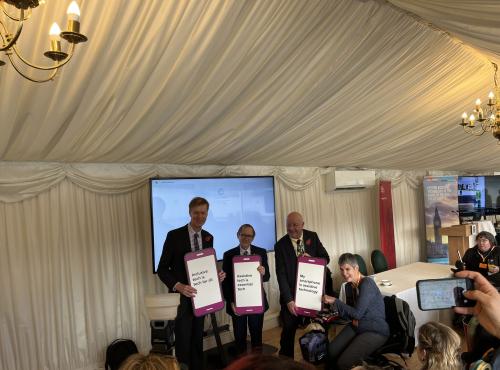Responding to Waste Crime: the Gaps a New Government Must Fill
In 2014, the Environmental Services Association Education Trust commissioned the sustainability consultancy Eunomia to investigate the scale of the problem of waste crime in Britain. Its findings were sobering. In their ground-breaking report, “Waste Crime: Tackling Britain’s Dirty Secret”, they estimated that fly-tipping, illegal waste sites and tax evasion in the waste sector was costing the UK economy around £570m a year.
This shocking figure spurred on a flurry of policy response to this crisis, including enhanced local authority powers, and a government consultation on extending the landfill tax to include illegal disposals.
But the latest research from the Environmental Services Association and the ESA Education Trust suggests that things haven’t been improving – and they may even be getting worse. In the follow-up report to the 2014 publication, the ESA suggest that waste crime now costs the economy in England alone as much as £600m a year. The latest report contained much more analysis and data from the Environment Agency, to arrive at the overall figure of £600m per year. Their report, “Rethinking Waste Crime” launched earlier this month, highlights the huge cost of waste crime, and makes a series of recommendations for Government to tackle the issue.
The ESA’s Head of Regulation, Sam Corp, says tighter regulation and more funding for enforcement is required to address waste crime and reduce the costs to business, society and the environment.
One of the major problems is the lack of regulation of registered waste collectors. Anyone can register for a waste carriers licence from the Environment Agency and few or no background checks are carried out. This has allowed unscrupulous operators, who merely dump the waste collected, to undermine legitimate carriers. This issue was reflected in Policy Connect’s Link to Link: Driving Resource Efficiency across Supply Chains report on resource efficiency across supply chains published in February 2016, which recommended that in the effort to reduce red tape, loopholes should not be created that circumvent important waste regulations.
Key recommendations from the ESA’s report include more upfront checks on waste carrier registrations, allowing the regulator to shut down illegal operators more quickly, and allocation of more funding to properly tackle the issue. The report also focuses on raising awareness of and tougher enforcement of waste ‘Duty of Care’ requirements. It advocates extending liability to all parties in the waste chain i.e. producer, carrier, broker that led to waste being deposited illegally to send out a strong message to take Duty of Care responsibilities seriously.
The need for a strong regulatory framework was also a key theme at Policy Connect’s Brexit event last December on the future of waste and recycling after leaving the EU. While the Government has not been in favour of additional regulation for businesses, many organisations see a level playing field as a key component of stability and investment for future growth. It will be interesting to see how the new administration responds to the crisis of waste crime after the general election. Party manifestos so far have made a few references to zero waste policies, but there will always be some waste which cannot be re-used or recycled and must be dealt with effectively. It remains to be seen if any firm action will be taken in the next Parliament.



